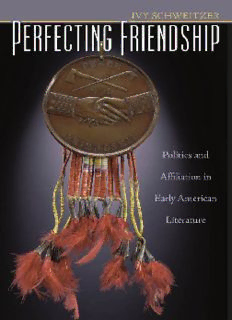
Perfecting Friendship: Politics and Affiliation in Early American Literature PDF
Preview Perfecting Friendship: Politics and Affiliation in Early American Literature
PERFECTING FRIENDSHIP This page intentionally left blank PERFECTING FRIENDSHIP Politics and A≈liation in Early American Literature IVY SCHWEITZER The University of North Carolina Press Chapel Hill ∫ 2006 The University of North Carolina Press All rights reserved Manufactured in the United States of America Designed by Jacquline Johnson Set in Bulmer by Keystone Typesetting, Inc. The paper in this book meets the guidelines for permanence and durability of the Committee on Production Guidelines for Book Longevity of the Council on Library Resources. Chapter 2 originally appeared in Early American Literature 4.3 (2005): 441–69, and chapter 3 origi- nally appeared in Arizona Quarterly 61.2 (Summer 2005): 1–32. Parts of chapter 4 are forthcoming as ‘‘Cooper’s Blood Brothers: Romancing National Identity,’’ in After American Exceptionalism, edited by Don Pease (Durham, N.C.: Duke University Press). Library of Congress Cataloging-in-Publication Data Schweitzer, Ivy. Perfecting friendship : politics and a≈liation in early American literature / Ivy Schweitzer. p. cm. Includes bibliographical references and index. isbn-13: 978-0-8078-3069-7 (alk. paper) isbn-10: 0-8078-3069-0 (alk. paper) isbn-13: 978-0-8078-5778-6 (pbk.: alk. paper) isbn-10: 0-8078-5778-5 (pbk.: alk. paper) 1. American literature—History and criticism. 2. Friendship in literature. 3. Winthrop, John, 1588– 1649. 4. Cooper, James Fenimore, 1789–1851— Criticism and interpretation. 5. Sedgwick, Catharine Maria, 1789–1867. Hope Leslie. 6. Foster, Hannah Webster, 1759–1840. Coquette. 7. Politics and literature—United States—History. 8. National characteristics, American, in literature. 9. Friendship—Sociological aspects. 10. Political culture—United States—History. I. Title. ps169.f69s39 2006 810.9%353—dc22 2006018318 cloth 10 09 08 07 06 5 4 3 2 1 paper 10 09 08 07 06 5 4 3 2 1 CONTENTS Acknowledgments ix Introduction: The Renascence of Friendship: A Story of American Social and Political Life 1 CHAPTER ONE Smoke and Mirrors: A History of Equality and Interchangeability in Friendship Theory 27 CHAPTER TWO ‘‘Familiar Commerce’’: John Winthrop’s ‘‘Modell’’ of American A≈liation 73 CHAPTER THREE Hannah Webster Foster’s Coquette: Resurrecting Friendship from the Tomb of Marriage 103 CHAPTER FOUR Eat Your Heart Out: James Fenimore Cooper’s Male Romance and the American Myth of Interracial Friendship 133 CHAPTER FIVE The Ethical Horizon of American Friendship in Catharine Sedgwick’s Hope Leslie 165 Epilogue: The Persistence of Second Selves 207 Notes 211 Works Cited 239 Index 259 This page intentionally left blank ILLUSTRATIONS Figure 1. Washington medal, 1792 20 Figure 2. Sagoyewatha or ‘‘Red Jacket’’ wearing Washington medal 21 Figure 3. Bona fide 48 Figure 4. Jusque a la mort 49 This page intentionally left blank ACKNOWLEDGMENTS After many years of pondering the meanings and strange slippage of liking and likeness, I have developed an even greater respect, if that were possible, for friendship and for the people and things that sustain me. This project has gone through many transformations. It began in the early 1990s when a prescient undergraduate student named Sharry Fisher, despondent over the state of interracial relations on the Dartmouth campus, urged me to teach courses on the historical and literary representations of women’s interracial relations. I discovered a large and growing body of works on the topic—remarkable stories like Grace Paley’s ‘‘The Long Distance Runner,’’ Toni Morrison’s ‘‘Recitatif,’’ and Tillie Olsen’s ‘‘O Yes.’’ I was particularly gripped by an early dialogue co-authored by philosophers María Lugones and Elizabeth Spelman, who conclude that, because friendship creates ‘‘a non-coerced space,’’ it is the ‘‘only appropriate and understandable motive’’ for doing feminist theory across racial and ethnic di√erences (23). But after several attempts to write a book focused on representations of women’s interracial relations, I realized that I did not know what friendship meant. Of course, I understood it in a personal and commonsensical way, but not as a cultural or historical discourse. Going back to the foundational texts about friendship in the Western tradition allowed me to see friendship as part of a very long philosophical discourse and as the preeminent a≈liative and democratic mode it was and could be again. Teaching and learning have been crucial to this study. Over the years I have worked with other remarkable students on related projects that have inspired me: Lisa DiIorio, Jean Young, Michelle Seldin, Ti√any West, Amanda Gilliam, Kinohi Nishikawa, Swati Rana, Mosopefoluwa A. Ogunyemi, Diana Bellonby, Matthew Duques, Paloma Wu, and Lauren Leblanc, among others. Several of my under- graduate research assistants at Dartmouth have been particularly helpful to this project and deserve thanks: Matthew Fujisawa, Liz Bertko, Tim Stanne, Miranda Johnson, Stacey Sherri√, Sue Kim, and Rebecca Slisz. I have also benefited immensely from an active, courageous, and supportive feminist community of scholars, especially the faculty in the Women’s and Gender
Description: